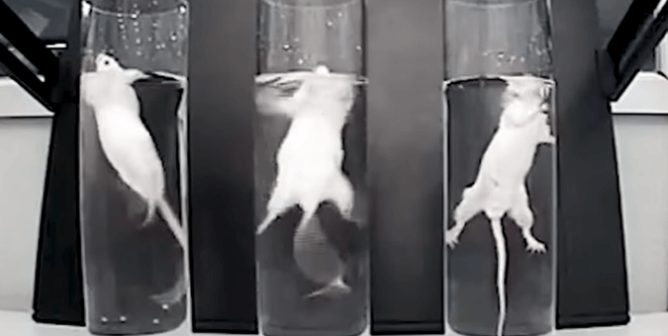National Toxicology Program
 For decades, the National Toxicology Program (NTP)—a U.S. government agency—has been notorious for conducting tests on animals. This testing includes the rodent cancer bioassay, which poisons 400 mice or rats for their entire lives. As of 2021, at least 240,000 animals have been killed at the NTP in more than 600 rodent cancer bioassays, which have had little or no impact on public health, as cancer rates continue to climb. Furthermore, each of these tests costs up to $2 million—taxpayer money that could be spent developing modern, non-animal test methods to protect human lives.
For decades, the National Toxicology Program (NTP)—a U.S. government agency—has been notorious for conducting tests on animals. This testing includes the rodent cancer bioassay, which poisons 400 mice or rats for their entire lives. As of 2021, at least 240,000 animals have been killed at the NTP in more than 600 rodent cancer bioassays, which have had little or no impact on public health, as cancer rates continue to climb. Furthermore, each of these tests costs up to $2 million—taxpayer money that could be spent developing modern, non-animal test methods to protect human lives.
Misplaced trust in animal tests has not only killed hundreds of thousands of animals and wasted resources but also misled the public about the effects of cigarette smoke and other cancer-causing substances. For these chemicals, tests on animals could not easily replicate the cancerous effects that had already been documented in humans. If animal tests failed to reliably identify well-known human carcinogens, how many other dangerous chemicals are Americans exposed to as a result of misleading animal tests?
PETA has been commenting on the NTP’s animal testing plans for years, including in comments submitted in 2009 on testing dietary supplements such as butterbur, evening primrose oil, valerian, and herbal medicines such as dong quai (a Chinese herbal remedy used for thousands of years and recognized as safe by the U.S. Food & Drug Administration following extensive testing, including on animals). PETA also commented on the NTP’s recommendation to conduct animal testing for soy infant formula, even though the formula ingredients are metabolized differently by rodents and humans and this product has been used safely since the early 1960s. In 2006, PETA commented on an NTP recommendation to conduct inhalation toxicity testing for asbestos and artificial butter flavoring in rodents despite the substantial physiological and anatomical differences between rodents and humans that prevent tests on rodents from reliably predicting human effects. In a number of cases over the years, the NTP Board of Scientific Counselors agreed with PETA’s comments and recommended a low priority for animal tests, including for flame retardants with existing test data and a chemical used in sunscreens and cosmetics (2-ethylhexyl p-methoxycinnamate) that had existing test data that had not been considered by the NTP. Instead of testing on animals, the NTP should funnel its resources into the development and use of human-relevant, non-animal tests.
21st Century Testing
Following decades of pressure from PETA, the tides have started to turn. In 2019, a new division of the NTP was established called the Division of the National Toxicology Program (DNTP). The DNTP covers several areas of research, including one that focuses on diseases, such as cancer. This program is taking steps to move away from the rodent cancer bioassays and instead rely on human relevant, non-animal approaches.
The NTP is also working to implement modern, non-animal testing approaches through participation in the Toxicology in the 21st Century program, a multi-governmental collaboration to assess a wide range of substances using cell-based methods, as well as through the NTP Interagency Center for the Evaluation of Alternative Toxicological Methods (NICEATM). NICEATM focuses on the development and evaluation of alternatives to animal testing and offers counsel to the Interagency Coordinating Committee on the Validation of Alternative Methods (ICCVAM). ICCVAM’s task is to promote non-animal test methods for government-required testing.







